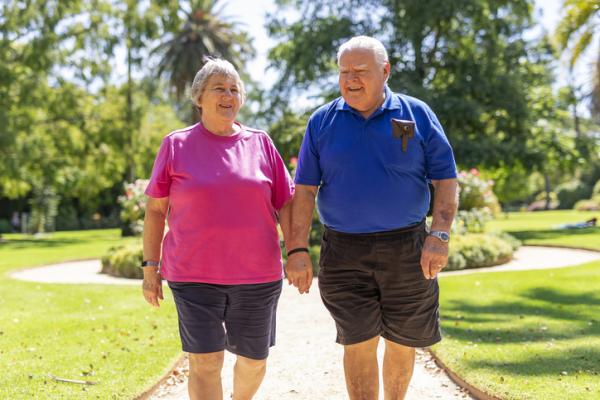
A newly-published study in the Journal of the American College of Cardiology (JACC) found that statin therapy does not exacerbate muscle injury, pain or fatigue in people engaging in moderate-intensity exercise, such as walking.
April 11, 2023 — A newly-published study in the Journal of the American College of Cardiology, JACC, the flagship journal of the American College of Cardiology (ACC), focuses on the impact of moderate exercise in patients using statins. It offers reassuring findings for people who experience muscle pain or fatigue from statins but need to engage in physical activity to keep their cholesterol levels low and their hearts healthy. The study, “Prolonged Moderate-Intensity Exercise Does Not Increase Muscle Injury Markers in Symptomatic or Asymptomatic Statin Users,” found that statin therapy does not exacerbate muscle injury, pain or fatigue in people engaging in moderate-intensity exercise, such as walking. First author on the JACC-published study was Neeltje Allard, MD, researcher at the Department of Integrative Physiology, Radboud University Medical Center in Nijmegen, Netherlands.
Statins have long been the gold standard for lowering LDL or “bad” cholesterol and preventing cardiovascular disease (CVD) events, noted the ACC summary of the published study. It added that while generally well-tolerated, statins can cause muscle pain and weakness in some. Physical activity is a cornerstone of CVD prevention — especially when combined with statins, however, studies have shown vigorous exercise can increase muscle damage in some statin users. This, in turn, can lead to decreased physical activity or cause people to stop taking their medication, which is what led Allard et al to zero in on moderate-intensity activities in the cross-sectional observational study. The researchers’ secondary objective was to also examine the association between leukocyte CoQ10 levels and muscle markers, muscle performance, and reported muscle symptoms.
Study Specifics
Researchers sought to compare the impact of moderate-intensity exercise on muscle injury in symptomatic and asymptomatic statin users, plus nonstatin using controls. Symptomatic vs. asymptomatic was determined by the presence, localization and onset of muscle cramps, pain and/or weakness using the statin myalgia clinical index score. Researchers also examined the association between leukocyte CoQ10 levels on muscle injury and muscle complaints, since statins may lower CoQ10 levels and reduced levels can predispose people to muscle injury.
All study participants walked 30, 40 or 50 km (18.6, 24.8 or 31 miles, respectively) per day at a self-selected pace for four consecutive days. Statin users had all been on the medication for at least three months. The researchers excluded those with diabetes, hypo- or hyperthyroidism, known hereditary skeletal muscle defects, other diseases known to cause muscle symptoms or those using CoQ10 supplementation. There were no differences in body mass index, waist circumference, physical activity levels or vitamin D3 levels (low vitamin D3 levels have been associated with statin-induced myopathy and therefore may be a risk-factor for statin-associated muscle symptoms) among the three groups at baseline.
Researchers concluded “Statin use and the presence of statin-associated muscle symptoms does not exacerbate exercise-induced muscle injury after moderate exercise. Muscle injury markers were not related to leukocyte CoQ10 levels.”
Outcomes and Insights
“Even though muscle pain and fatigue scores were higher in symptomatic statin users at baseline, the increase in muscle symptoms after exercise was similar among the groups,” said Allard. “These results demonstrate that prolonged moderate-intensity exercise is safe for statin users and can be performed by statin users to maintain a physically active lifestyle and to derive its cardiovascular health benefits,” according to Allard.
Researchers did not find a correlation between leukocyte CoQ10 levels and muscle injury markers at baseline or after exercise nor was there a correlation between CoQ10 levels and muscle fatigue resistance or muscle pain scores.
In an accompanying JACC editorial comment, Robert Rosenson, MD, Director of Metabolism and Lipids for the Mount Sinai Health System in New York, said patients experiencing statin associated muscle symptoms will often avoid exercise because of muscle pain and weakness and concerns of making the pain worse; however, exercise is essential for restoring and maintaining fitness in people at increased risk for cardiovascular disease or who have had a cardiovascular event.
“[Based on the study], many patients who develop statin associated muscle symptoms may engage in a moderately intensive walking program without concern for worsened muscle biomarkers or performance,” said Rosenson.
Others joining Allard in conducting the study included: Lando Janssen, Bart Lagerwaard, Malou A.H. Nuijten, Coen C.W.G. Bongers, Richard J. Rodenburg, Paul D. Thompson, Thijs M.H. Eijsvogels, Willem J.J. Assendelft, Tom J.J. Schirris, Silvie Timmers, and Maria T.E. Hopman.
For more information: www.jacc.org


 July 31, 2024
July 31, 2024 









